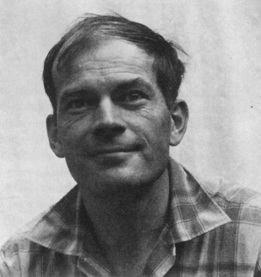Robert H. MacArthur facts for kids
Quick facts for kids
Robert Helmer MacArthur
|
|
|---|---|
 |
|
| Born | April 7, 1930 |
| Died | November 1, 1972 (aged 42) |
| Alma mater | Marlboro College (BA) Brown University (AM) Yale University (PhD) |
| Known for | Island biogeography |
| Spouse(s) | Elizabeth Bayles Whittemore |
| Children | 4 |
| Awards | National Academy of Sciences (1969) |
| Scientific career | |
| Fields |
|
| Institutions | |
| Thesis | Population Ecology of Some Warblers of Northeastern Coniferous Forests (1957) |
| Doctoral advisor | G. Evelyn Hutchinson |
| Other academic advisors | David Lack |
Robert Helmer MacArthur was a very important ecologist. He was born in Canada on April 7, 1930. He later became an American citizen. Robert MacArthur greatly changed how we understand community and population ecology. Many people consider him one of the main founders of the science of ecology. He passed away on November 1, 1972.
Contents
Early Life and Studies
Robert MacArthur was born in Toronto, Ontario. His father, John Wood MacArthur, was also a professor. The family later moved to Marlboro, Vermont. This happened when his father started working at Marlboro College.
Robert MacArthur studied mathematics first. He earned his first degree from Marlboro College. Then, he got a master's degree from Brown University in 1953.
Becoming an Ecologist
He then went to Yale University. There, he studied with a famous scientist named G. Evelyn Hutchinson. Robert MacArthur earned his Ph.D. in 1957. His special project was about how five different kinds of warbler birds shared their living spaces. These birds lived in the pine forests of Maine and Vermont. After his Ph.D., he worked with David Lack for a year.
Career and Discoveries
From 1958 to 1965, Robert MacArthur was a professor. He taught at the University of Pennsylvania. After that, he became a biology professor at Princeton University. He worked there from 1965 until 1972.
Island Biogeography
MacArthur helped develop the idea of niche partitioning. This is about how different species can live together. They do this by using resources in slightly different ways.
He also wrote a very important book. It was called The Theory of Island Biogeography. He wrote it with another scientist, E.O. Wilson, in 1967. This book completely changed the study of biogeography. It also helped create modern landscape ecology.
Changing the Field of Ecology
Robert MacArthur believed in testing ideas with experiments. This helped change ecology a lot. Before him, ecology was mostly about describing nature. He helped make it a field that used experiments and mathematical ideas. This led to the growth of theoretical ecology.
At Princeton, he was the main editor for a series of books. These books were about population biology. He also helped start a science magazine called Theoretical Population Biology. In 1972, he wrote another book. It was called Geographical Ecology: Patterns in the Distribution of Species.
In 1969, Robert MacArthur was chosen to join the United States National Academy of Sciences. This is a very high honor for scientists. He passed away in 1972 from kidney cancer.
See also
- Island biogeography
- Optimal foraging theory
- Robert H. MacArthur Award

